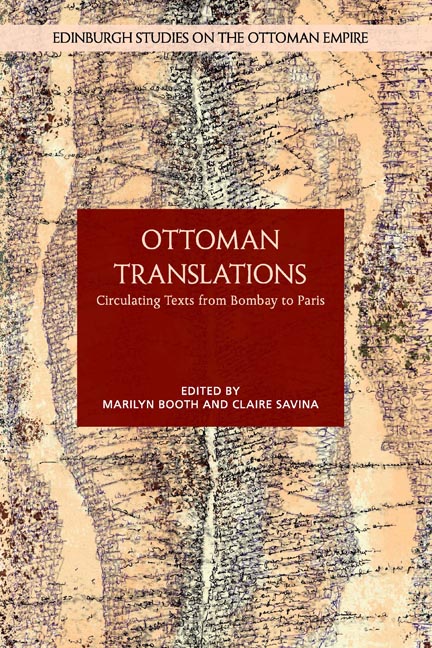Book contents
- Frontmatter
- Contents
- Note on Translation, Transliteration and Form
- Acknowledgements
- Notes on Contributors
- Introduction – Ottoman Central: Circulating Translations from the Indian Ocean to the Eastern Mediterranean and on to the Far West of Europe
- Part I Proliferating Classics
- Part II Mediterranean Multiples
- Part III Women In Translation
- Index
- Miscellaneous Endmatter
7 - Muslim Woman: The Translation of a Patriarchal Order in Flux
Published online by Cambridge University Press: 19 October 2023
- Frontmatter
- Contents
- Note on Translation, Transliteration and Form
- Acknowledgements
- Notes on Contributors
- Introduction – Ottoman Central: Circulating Translations from the Indian Ocean to the Eastern Mediterranean and on to the Far West of Europe
- Part I Proliferating Classics
- Part II Mediterranean Multiples
- Part III Women In Translation
- Index
- Miscellaneous Endmatter
Summary
This obligation [of men to be responsible for feeding women] is analogous to the obligation that destines the working class of people to feed the thinking class so that the latter may be fully enabled to do its original task.
Al-Mar’a al-muslima (‘Muslim woman’) was penned by the Cairo-based scholar Muhammad Farid Wajdi (1878–1954) in 1901. In the introduction, Wajdi clearly states that he wrote his book as a reaction to Qasim Amin’s (1863–1908) al-Marʼa al-jadida (‘New woman’), 1900. In fact, this may not have been Wajdi’s first critical engagement with Amin’s work; for he had purportedly written brief responses to Amin’s earlier book, Tahrir al-marʼa (‘Emancipation of women’, 1899). The publication of the latter book was a momentous event, resulting in an explosion of responses by the different cultural and intellectual stakeholders in Egypt. The wide-ranging debates reveal the relationship between the question of women and a number of other contentious issues. These range from attitudes towards science, positivism and materialism, to rethinking power and authority, passing through concerns with how to best draw the limit between the public and the private spheres. The accurate conceptualisation of human nature and of the civilisation that would be most harmonious with it are central to these debates. The controversy spurred by Amin’s book was so intense that he decided to reply by writing another book: this is his New Woman. In it, he attempts to further clarify his argument.
Muslim Woman, then, is a response to a response since Amin’s New Woman was framed as a reaction to the critics of Emancipation of Women. In this manner, Wajdi’s book enfolds a series of articulated positions: Amin’s initial polemic, the numerous responses to him, followed by Amin’s response to those, and culminating in Wajdi’s own reaction to all of that. In a few years, and specifically in 1908, Muslim Woman crosses over to the centre of the Ottoman Empire. The Istanbul-based writer and poet Mehmed Akif (1873–1936) began to publish a serialised Ottoman Turkish translation, Müslüman Kadını, of Wajdi’s Muslim Woman in the newly established journal, Sırat-ı Müstakim (‘Straight path’, 1908–1925).
- Type
- Chapter
- Information
- Ottoman TranslationCirculating Texts from Bombay to Paris, pp. 286 - 326Publisher: Edinburgh University PressPrint publication year: 2022



